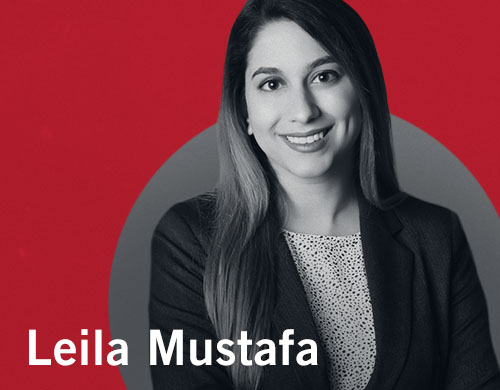 March 31, 2021
March 31, 2021 Leila Mustafa is an attorney based in the Waters Kraus Paul & Siegel Dallas office. She was awarded her Juris Doctor degree from SMU Dedman School of Law after completing her bachelor’s in journalism and psychology. She is a member of the American-Arab Anti-Discrimination Committee, which seeks to defend civil rights for all people and promote civic participation. Leila’s practice concentrates on asbestos litigation, product liability, and toxic tort matters.
Here’s what Leila had to say during our Women’s History Month Women In Law Roundtable Q&A.
Waters Kraus Paul & Siegel: According to the American Bar Association, there are approximately 1.4 million licensed attorneys in the United States. While there may be obvious overlap in experiences and reasons for choosing to become a lawyer, no two people are the same. What, or who inspired you to pursue a career in law?
Leila Mustafa: I grew up the daughter of immigrant parents who worked very hard to afford their children the opportunity to learn and work in this country. Their hard work served as the primary inspiration for me to find a profession that would always challenge me and make their sacrifices worthwhile. I also wanted to be in a position to help others, which was a continual theme in my upbringing.
WKPS: Determination and a tough work ethic are part of a universal code shared among successful attorneys. In fact, a career as a lawyer has been a hallmark of prestige for generations now. But what exactly enabled your career to flourish? How would you personally encourage young girls who are thinking about becoming attorneys but are scared of the challenges that lie ahead?
LM: Certainly, having my family’s support enabled me to flourish. For those who do not have that type of support around them, I would implore them to find it elsewhere. In my experience, women in the law want each other to succeed, even when they are your adversaries. There are several great networking groups for both aspiring and practicing women lawyers with programming to address commonly-shared challenges for women in this industry. Ultimately, it is important to remind yourself that you are capable and just as effective as a man would be in this setting, even if others around you are telling you otherwise.
WKPS: Amid the COVID-19 pandemic, many routine aspects of legal work like working from the office and court attendance have been suspended or amended. How have these changes impacted your own career?
LM: I think these changes have helped remind lawyers of all experience levels that we must be as prepared as possible for our clients. Whether we are on Zoom or in person, knowing our client’s case inside and out will rule the day over even when glitches occur that are not in our control.
WKPS: As a professional, what are the biggest challenges you have faced since starting work from home?
LM: Considering that I do not have caretaking responsibilities at this time, I recognize that my experience working from home is likely easier than the experience of others. However, similar to what I noticed in law school, I would imagine that people with those responsibilities learned to develop time management skills even more effortlessly than those without them. I suspect that their clients are just as effectively represented as they were before the pandemic.
WKPS: Where do you think we are in terms of gender equality in the legal profession? Do you believe that people’s expectations of women lawyers have changed in the past 50 years? Or will the majority of Americans always be more willing to put their faith in men practicing law?
LM: Gender equality in the legal profession has improved over the past 50 years, but there is still a long way to go. The ratio of female partners at law firms to women practicing law generally is still much lower than the relevant ratios for men. This gap is extremely concerning considering that, in recent years, it is frequently the case that more women are enrolled at law schools than men. However, I do think public perception is changing, and more and more Americans are willing to let go of their preconceived notions that men are more effective lawyers.
WKPS: What needs to change in our society, or globally, for women to receive their fair share in their legal professions and every other position?
LM: Women and men have to acknowledge that there is an achievement gap for women lawyers and make space for women to be advanced into positions of power. Women shouldn’t have to fight this fight by themselves. Luckily, many men have already made this a priority.


